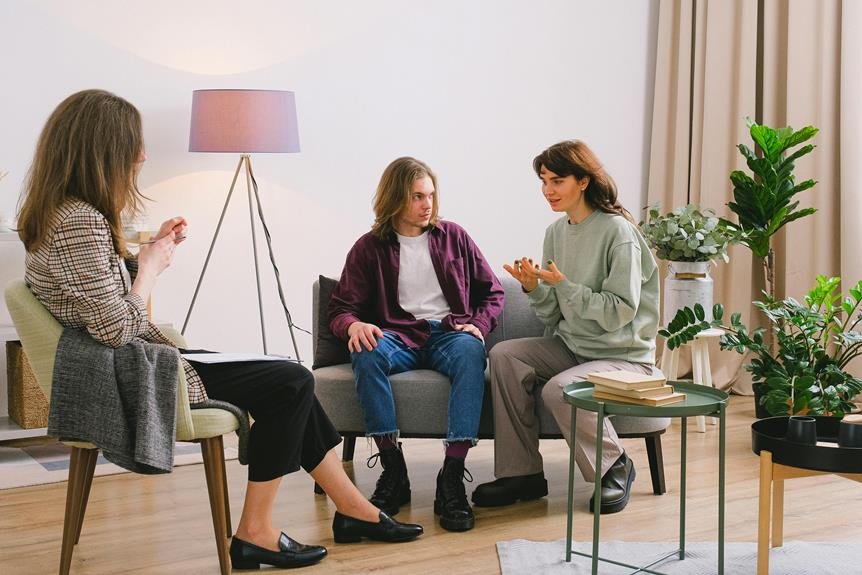How to Discuss Trust Issues With Your Partner

Address trust issues by understanding root causes, setting a safe space, and using active listening techniques. Explore past emotional scars and foster open communication to build empathy and intimacy. Create a secure environment with clear boundaries and encourage vulnerability for emotional connection. Practice reflective listening, validate feelings, and engage actively to show empathy. Establish mutual commitments reflecting shared values and goals to align aspirations. By taking these steps, you can begin a constructive dialogue with your partner to strengthen trust and nurture a healthier relationship.
Key Takeaways
- Practice active listening to understand your partner's perspective.
- Create a safe space for open communication without judgment.
- Share vulnerabilities to deepen emotional connection and build trust.
- Establish mutual commitments to strengthen the relationship.
- Validate your partner's feelings and show empathy in responses.
Understanding the Root Causes
To address trust issues with your partner effectively, it's crucial to first explore understanding the root causes of these feelings. Building empathy is key in this process. Take the time to listen actively and try to see things from your partner's perspective. Addressing fears openly and honestly can help create a safe space for both of you to express your emotions.
Trust issues often stem from past experiences that have left emotional scars. It's important to recognize that everyone carries their own baggage, and these past hurts can manifest in current relationships. By acknowledging these fears, you can work together to address them head-on.
Communication is essential when delving into the root causes of trust issues. Be open about your feelings and encourage your partner to do the same. Understanding where these fears originate can lead to greater intimacy and a deeper connection between you both.
Setting a Safe Space
Creating a secure environment in your relationship is essential for fostering open communication and addressing trust issues effectively. To set a safe space for discussing trust issues with your partner, it's vital to establish clear boundaries. Boundaries help create a sense of safety and respect within the relationship, ensuring that both partners feel comfortable expressing their thoughts and emotions without fear of judgment or dismissal.
Building empathy is another key aspect of setting a safe space. Empathy involves actively listening to your partner, trying to understand their perspective, and acknowledging their feelings without invalidating them.
Active Listening Techniques
Establishing active listening techniques is key for creating a supportive and understanding environment when discussing trust issues with your partner. Reflective listening involves paraphrasing what your partner says to show you grasp their perspective.
Validation is vital; acknowledge your partner's feelings and experiences are real and valid. Empathetic responses demonstrate your understanding and compassion. Mirroring involves repeating back what your partner has said to ensure you've understood their message accurately.
During conversations about trust issues, it's crucial to practice these techniques actively. Make eye contact, nod to show you're engaged, and provide verbal cues like 'I see' or 'I understand.' Avoid interrupting or formulating your response while your partner is speaking – truly listen first.
Sharing Vulnerabilities
Developing a strong emotional connection with your partner necessitates vulnerability and honesty in sharing your innermost feelings and concerns. Open communication is key in fostering trust and intimacy. When you share your vulnerabilities with your partner, it creates a safe space for both of you to be authentic and deepen your bond.
To share vulnerabilities effectively, it's crucial to approach the conversation with empathy and understanding. Express your feelings openly and encourage your partner to do the same. Remember, it's about creating a supportive environment where both of you feel heard and emotionally supported.
Embracing vulnerability in a relationship can be intimidating, but it's a powerful way to build trust and strengthen your connection. When you both feel comfortable sharing your innermost thoughts and fears, it lays the foundation for deeper emotional intimacy.
Establishing Mutual Commitments
To strengthen trust in your relationship, it's crucial to outline mutual commitments that reflect your shared values and goals. Open communication plays a significant role in establishing these commitments.
Sit down with your partner and have an honest conversation about what each of you expects regarding trust and commitment. Listen actively to each other's perspectives and make sure that both of you feel heard and understood.
Shared goals are another cornerstone of building trust. Discuss where you see the relationship heading and what steps you both need to take to get there. By aligning your aspirations and working together towards common objectives, you solidify your bond and create a sense of unity.
Frequently Asked Questions
How Can I Rebuild Trust After Infidelity?
To rebuild trust after infidelity, focus on trust rebuilding strategies like open communication, transparency, and consistency. Use communication techniques such as active listening, expressing feelings honestly, and seeking professional support to navigate this challenging journey together.
Is It Normal to Have Trust Issues From Past Relationships?
Feeling trust issues from past relationships is common. Building boundaries and self-care practices can help. Reflect on past experiences, communicate openly, and prioritize your emotional well-being. You deserve to feel secure in your relationships.
What if My Partner Doesn't Want to Discuss Trust Issues?
If your partner avoids discussing trust issues, it's essential to respect their boundaries. Consider different communication styles to broach the topic gently. Building rapport and seeking support together can create a safe space for meaningful conversations.
Can Trust Issues Be Resolved Without Therapy?
You can resolve trust issues without therapy by prioritizing self-reflection and open communication. Establish healthy boundaries, understand each other's perspectives, and work together to rebuild trust. It takes effort, but it's possible with dedication and understanding.
How Do I Know if My Partner Is Being Honest With Me?
To determine if your partner is honest, pay attention to their communication tactics and body language cues. Engage in trust-building exercises and encourage vulnerability sharing. Transparency and open dialogue are key to fostering trust.
Conclusion
Addressing trust issues with your partner can be difficult, but by understanding the root causes, creating a safe space, actively listening, sharing vulnerabilities, and establishing mutual commitments, you can work through them together.
Remember, communication is key in any relationship. Trust takes time to build and repair, so be patient and open with each other. With effort and understanding, you can strengthen your bond and overcome any obstacles that come your way.







5 Comments